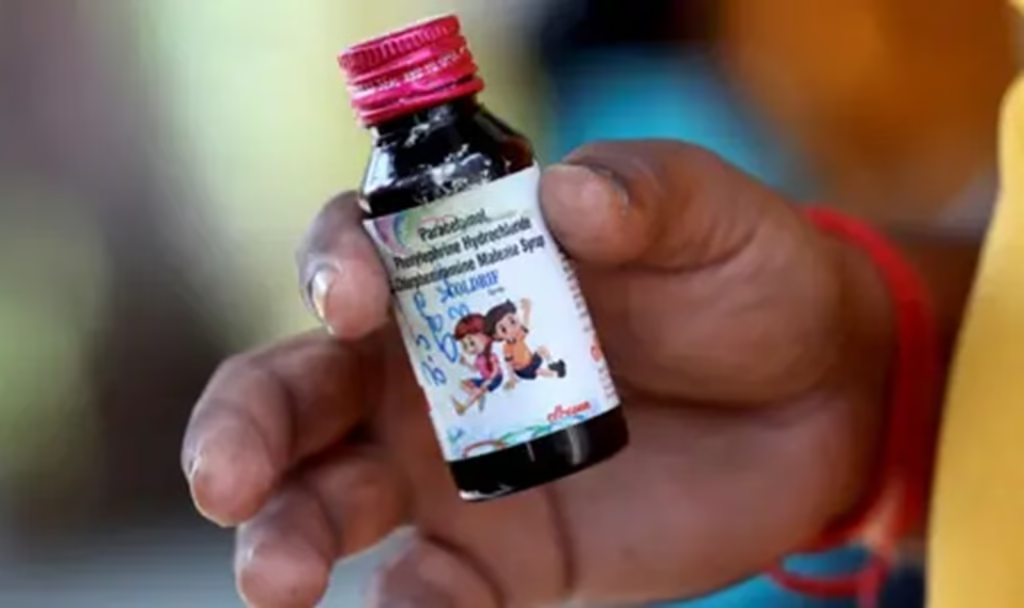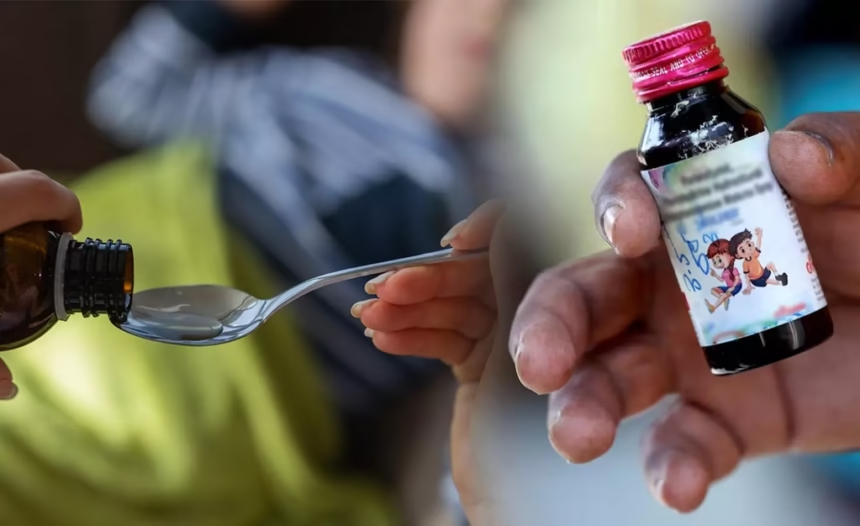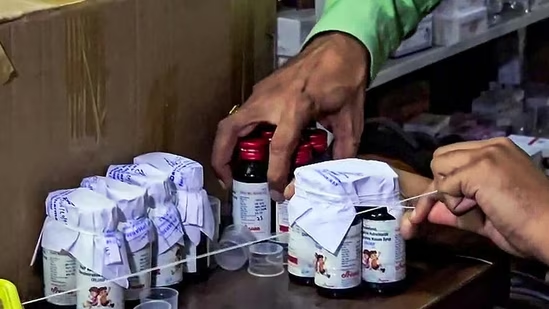NEW DELHI – In the backstreets of Chhindwara in Madhya Pradesh, grief has settled over homes where parents once trusted a simple cough syrup to soothe sick children. Those same bottles, dressed in bright labels, are now tied to a tragedy.
At least 20 children under five have died from acute kidney failure after taking medicines tainted with diethylene glycol (DEG), an industrial solvent used in antifreeze and brake fluid.
The World Health Organization has raised “deep concern” about weaknesses in India’s medicine safety systems, warning that poor oversight risks allowing toxic products to reach other countries through informal trade. On Monday, the U.N. health agency said three syrups, Coldrif Dry Cough Syrup, Respifresh TR, and ReLife, tested positive for DEG at nearly 500 times the legal limit.
WHO urged health authorities worldwide to look for these brands. “WHO is deeply saddened by these tragic events and extends its condolences to the affected families,” a spokesperson told Reuters, calling for urgent tracing of the source and removal of any remaining stock.
The crisis began in late August after a cluster of unexplained child deaths in Chhindwara, Betul, and Pandhurna. Children as young as one arrived with fever and vomiting, then suffered rapid organ failure, a pattern seen in severe renal injury and encephalitis-like illness.
By early October, the death toll had reached 20, and five more children were in critical care at Government Medical College, Nagpur. In Rajasthan, officials investigated at least three more deaths, though some were later linked to illnesses such as meningitis and acute breathing problems.

Coldrif Cough Syrup
Investigators have focused on Sresan Pharmaceuticals, a company based in Tamil Nadu, whose Coldrif cough syrup is suspected as the main cause. Lab analysis found the product contained 48.6 percent DEG, a toxic alcohol that damages the kidneys, nervous system, and liver. Even small amounts can be deadly for young children.
DEG can slip into medicines when manufacturers use it as a cheaper substitute for propylene glycol in sweet formulations. “It’s a silent killer,” said Dr. Naseem Hudroge, a WHO analyst on substandard medical products. “This isn’t new – it’s been plaguing supply chains for 90 years, claiming over 1,300 lives, mostly children.”
Outside the hospital in Nagpur, 32-year-old Nilesh Suryavanshi grips a worn Coldrif bottle while his three-year-old son remains on dialysis. “We trusted the chemist. It was just a cough,” he told Reuters as another stretcher rolled past.
In Parasia, Madhya Pradesh, Saddam Mansuri, a father of two, stares at similar bottles he once gave to his one-year-old. “How do you explain to a child that the medicine meant to heal is what’s poisoning them?” Their stories echo across villages where over-the-counter syrups are often the first choice during monsoon season and are sometimes handed out without a proper prescription.
Authorities moved fast, but progress has been uneven. On 8 October, police in Madhya Pradesh arrested G. Ranganathan, the 73-year-old owner of Sresan, after a day-long search. The long-time industry figure now faces charges of culpable homicide and endangering public health.
Cough Syrup and Cold Syrup Restrictions
Tamil Nadu Health Minister Ma. Subramaniam announced the permanent cancellation of Sresan’s manufacturing licence, citing “unhygienic conditions” at the Kanchipuram plant, including rusted machinery and poor storage. Production of all Sresan products has been halted nationwide, and the Central Drugs Standard Control Organization (CDSCO) ordered joint inspections of cough syrup makers across six states.
Bans spread quickly. Madhya Pradesh Chief Minister Mohan Yadav blocked Coldrif sales across the state. Tamil Nadu and Kerala extended bans to all Sresan products. Some areas, including parts of Gujarat, went further and restricted all cough and cold syrups for children under two, aligning with health ministry advice on rational use.
CDSCO told WHO that no tainted batches were exported, averting a global alert for now, though the agency is checking informal supply routes. “We’ve inspected 19 manufacturers and seized samples,” a health ministry official said, adding that reforms would target “quality control lapses.”
Even so, the risk remains. Pharmacies in Madhya Pradesh and Rajasthan still hold leftover Coldrif and related syrups, slipping through patchy recall efforts. “Rural chemists don’t always get the memos in time,” a Bhopal distributor said on condition of anonymity. “By the time bans hit, batches are scattered in villages.”
The delay highlights WHO’s core criticism, a regulatory gap in testing syrups for DEG when sold at home, compared with tighter export checks introduced after scandals in 2022. India’s pharmaceutical industry, worth about $50 billion and the third-largest by volume, relies on generics while struggling to supervise more than 3,000 small manufacturers that supply low-cost medicines.
WHO Alerts and U.S. Import Bans
Past disasters hang over the current crisis. In 2022, syrups made by Maiden Pharmaceuticals in India were linked to the deaths of over 70 children in Gambia, leading to WHO alerts and U.S. import bans. Uzbekistan reported 72 deaths that same year, followed by cases in Indonesia and Cameroon.
The global toll approached 300. India has seen its own tragedies, including 12 child deaths in Jammu from 2019 to 2020, with fears of other unreported clusters. “It’s déjà vu,” said Dr. Hudroge. “Regulators promise fixes after headlines fade, but fragmented enforcement lets history repeat.” A 2023 U.S. CDC report tied the Gambia deaths to Indian contaminants, worsening mistrust. New Delhi disputed the findings, but confidence was shaken.
Opposition figures and medical leaders want tougher action. Congress leader Sachin Pilot called for a judicial inquiry, arguing that internal government probes lack teeth. “This isn’t just negligence; it’s systemic failure,” he said in parliament, pushing for mandatory DEG testing for all syrups. The Indian Medical Association backed the call, asked Health Minister J.P. Nadda to drop cases against whistleblower pediatricians, and pressed for uniform national standards.
For families like the Suryavanshis, change cannot wait. As Diwali lights glow in Chhindwara’s markets, grieving mothers light lamps for lost children, with syrup bottles kept as grim reminders. “We need more than arrests,” Suryavanshi said. “We need safeguards so no parent poisons their own child chasing a cure.”
WHO has offered help, but the responsibility sits with India to close regulatory gaps and restore confidence. In a country of 1.4 billion that depends on its drug industry, this is not only a health emergency, it is a crisis of trust that could reach far beyond its borders. Until then, every nighttime cough carries a shadow of fear.
Source: Reuters















